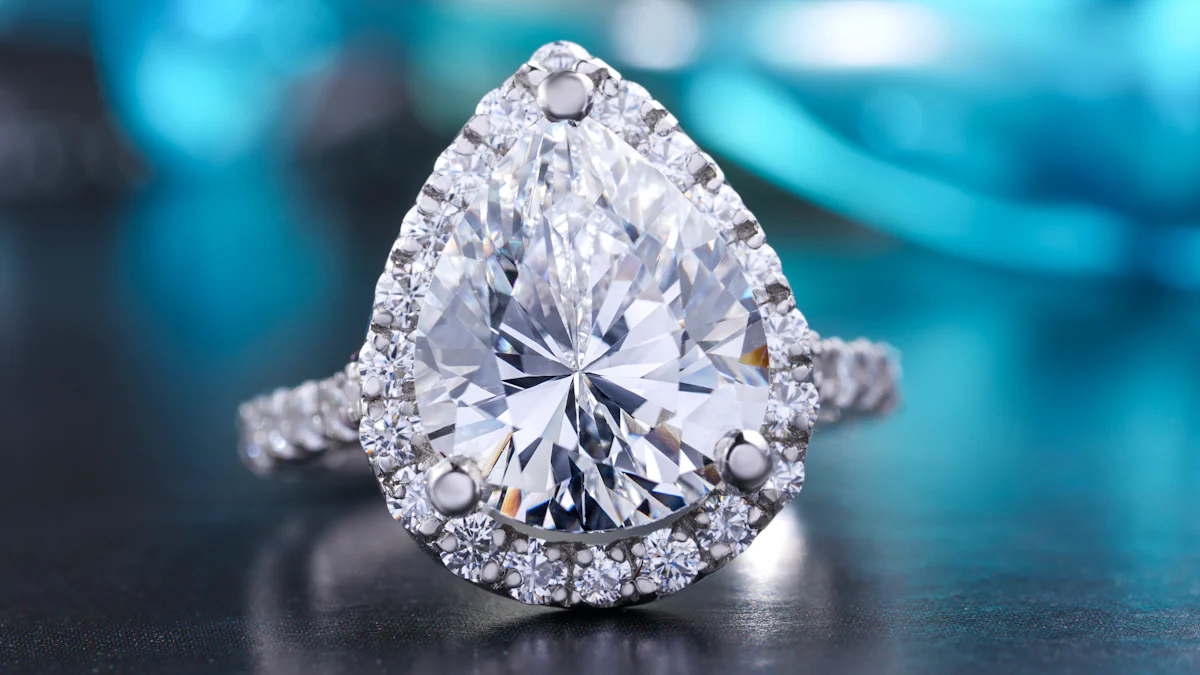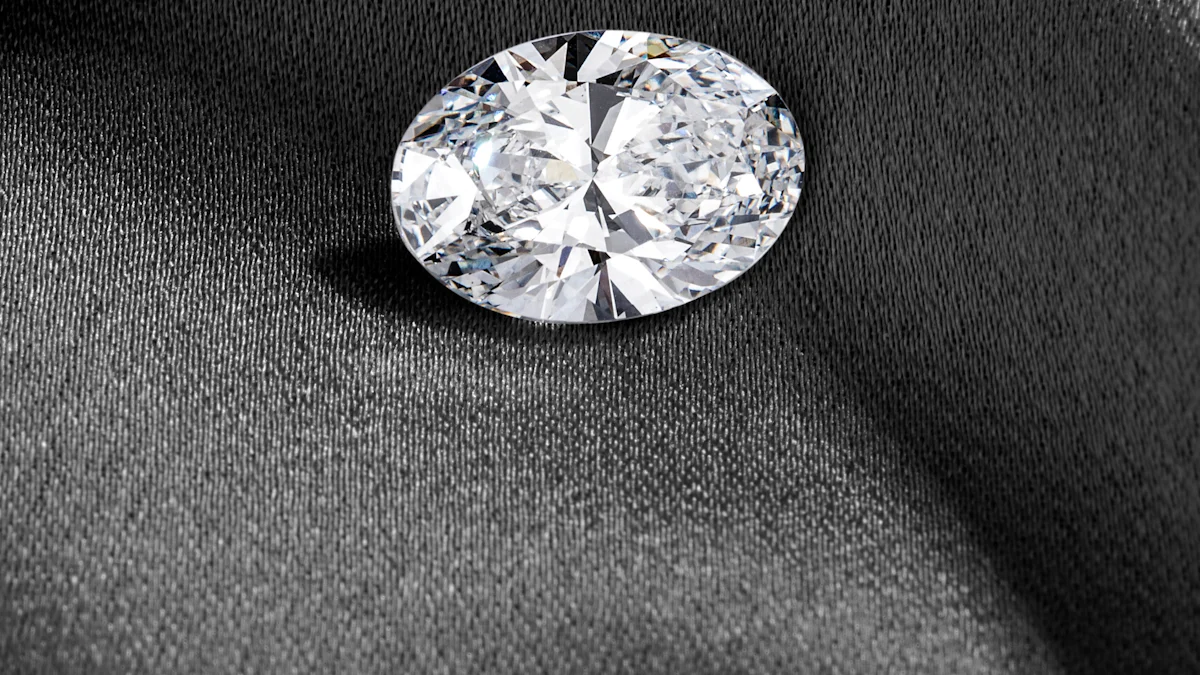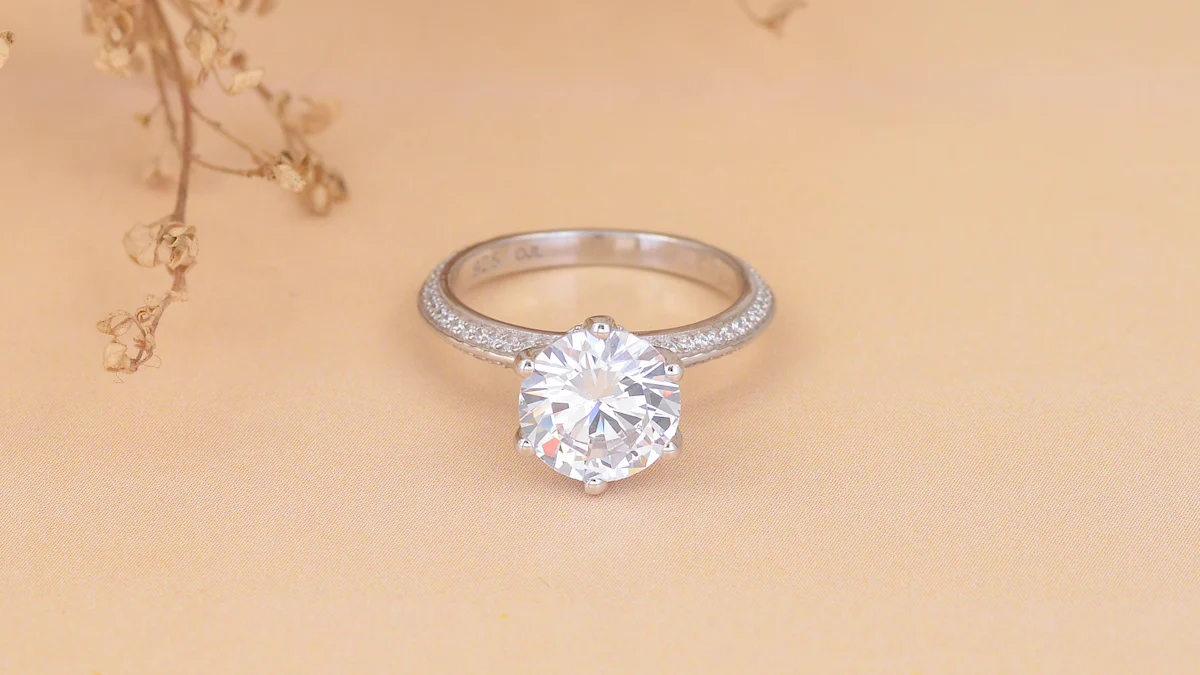1 Carat vs 2 Carat Diamond Visual Differences Guide

When comparing a 1 carat vs 2 carat diamond, the most noticeable difference lies in their size and visual impact. A 2-carat diamond appears significantly larger, with a diameter of 8.1 mm compared to the 6.5 mm diameter of a 1-carat diamond. This size difference enhances its brilliance and presence.
| Carat Weight | Weight (grams) | Diameter (mm) |
|---|---|---|
| 1 Carat | 0.2 (200 mg) | 6.5 |
| 2 Carat | 0.4 (400 mg) | 8.1 |
The choice between these diamonds often depends on your priorities. Many buyers prefer 1-carat diamonds for their affordability and elegant appearance. Others opt for 2-carat diamonds to achieve a bolder look, despite the higher price. This guide will help you understand these differences and make an informed decision.
What Does Diamond Carat Weight Mean?
Definition of Diamond Carat Weight
When you hear the term "diamond carat weight," it refers to the weight of the diamond, not its size. A carat is a unit of measurement equal to 200 milligrams. This system has been in use since the 1500s and originally came from the carob seed, which was historically used to weigh gemstones. For precision, carat weight can be measured to the thousandth decimal place.
To make it easier to understand, each carat is divided into 100 points. For example, a 0.50-carat diamond is often called a "50-point diamond." While carat weight is about the diamond's mass, it doesn't always reflect how large the diamond appears. Factors like cut and shape play a significant role in its visual size.
How Carat Weight Impacts Diamond Carat Size
Carat weight directly affects the diamond's physical size, but it’s not the only factor. A diamond with a higher carat weight will generally appear larger. However, the cut of the diamond can change how big it looks. For instance, a well-cut diamond may have less depth and more spread, making it appear larger than a poorly cut diamond of the same weight.
Even diamonds with the same carat weight can look different in size. This happens because their measurements in millimeters vary based on their cut and shape. A diamond with a shallow cut may look wider, while a deeper cut might make it appear smaller.
Carat Weight vs. Other Factors (Cut, Shape, and Setting)
While carat weight is important, you should also consider other factors like cut, shape, and setting. The cut determines how well the diamond reflects light, which can make it look bigger and more brilliant. Shapes like round or oval tend to maximize the diamond carat size, while shapes like emerald or pear may emphasize elegance over size.
The setting also plays a role in enhancing the diamond's appearance. A halo setting, for example, surrounds the diamond with smaller stones, making it look larger. Choosing the right combination of carat weight, cut, shape, and setting ensures you get the perfect balance of size and brilliance.
1 Carat vs 2 Carat Diamond: Visual Size Comparison

Physical Size Differences
When comparing the physical size of a 1 carat diamond to a 2 carat diamond, the difference is noticeable. A 1 carat diamond weighs approximately 200 milligrams, while a 2 carat diamond doubles that weight at 400 milligrams. This increase in weight translates to a larger face-up size. The diameter of a 1 carat diamond is about 6.5mm, whereas a 2 carat diamond typically measures 8.10mm.
- A 1 carat diamond is smaller and lighter.
- A 2 carat diamond has a more substantial presence due to its larger diameter and weight.
This size difference creates a distinct visual impact, making the 2 carat diamond appear more prominent in any setting. However, the choice between these sizes depends on your preferences and priorities.
How Diamond Carat Size Appears on the Hand
The way a diamond looks on your hand depends on its carat size and the size of your fingers. A 1 carat diamond offers a delicate and elegant appearance, especially on smaller hands. Its face-up size is subtle yet brilliant. On the other hand, a 2 carat diamond provides a bolder and more eye-catching look. Its larger face-up size covers more surface area, making it stand out significantly.
If you have slender fingers, a 1 carat diamond may appear proportionate and refined. For wider fingers, a 2 carat diamond can create a balanced and striking effect. Trying on different carat sizes can help you visualize how they complement your hand.
The Role of Settings in Enhancing Size
The setting you choose plays a crucial role in enhancing the perceived size of your diamond. A bezel setting, which surrounds the diamond with a thin metal rim, can make the stone appear larger by adding width to its perimeter. However, it may obscure parts of the diamond's circumference. Prong settings, on the other hand, expose more of the diamond, allowing light to enter and increasing its brilliance and visual size.
A raised setting can also enhance the diamond's prominence by creating a sense of height. Additionally, the choice of metal, such as white gold or platinum, affects how light reflects off the diamond, further influencing its visual impact. Selecting the right setting ensures your diamond carat size looks its best.
The Impact of Cut and Shape on Diamond Carat Size

How Cut Quality Affects Perceived Size
The cut quality of a diamond plays a significant role in its perceived size. A well-cut diamond reflects light more effectively, making it appear larger and more brilliant. On the other hand, a poorly cut diamond may lose its brilliance and look smaller than its actual carat weight. For example, a 1-carat diamond with an excellent cut can look more impressive than a 1.5-carat diamond with a poor cut.
💡 Tip: Always prioritize cut quality when choosing a diamond. It enhances both brilliance and perceived size, ensuring your diamond looks its best.
Certain shapes, such as pear or oval, can also make a diamond appear larger than its carat weight suggests. A beautifully cut diamond maximizes light return, creating a dazzling effect that draws attention. Remember, a 2-carat diamond does not necessarily look twice as large as a 1-carat diamond. The cut quality determines how much visual impact the diamond delivers.
Popular Shapes for 1-Carat and 2-Carat Diamonds
When selecting a diamond, the shape significantly influences its appearance. Some shapes are more popular for their ability to enhance brilliance or perceived size.
- Round Brilliant: Known for its unmatched sparkle but may appear smaller compared to elongated shapes.
- Oval: Its elongated form gives it a larger appearance than round diamonds of the same carat weight.
- Marquise: The long, narrow shape often looks larger than its actual size.
- Emerald: A rectangular shape with unique clarity but less brilliance.
- Princess: Offers a modern look with high sparkle, similar to round diamonds.
- Cushion: Varies in appearance, influencing how large it looks.
- Radiant: Combines the brilliance of round with the silhouette of emerald.
- Heart: A romantic shape that can affect brilliance and size perception.
Each shape has its own charm. Consider your personal style and how the shape complements the diamond's carat weight.
Shape and Its Influence on Visual Size
The shape of a diamond directly impacts its visual size. Round diamonds, with their symmetrical design, tend to look proportionate to their carat weight. However, elongated shapes like oval or marquise often appear larger due to their extended surface area.
- Oval diamonds may look bigger than round diamonds of the same carat weight.
- Marquise cuts create the illusion of a larger diamond with their long, narrow shape.
- Emerald cuts showcase a "hall-of-mirrors" effect, which influences how the diamond's size is perceived.
- Cushion cuts vary in their appearance, affecting how large they seem to the eye.
Choosing the right shape allows you to maximize the perceived size of your diamond. This guide helps you understand how shape and cut work together to enhance the diamond's overall appeal.
Price and Value of 1-Carat vs 2-Carat Diamonds
How Carat Weight Affects Price
Carat weight significantly influences the price of a diamond. Larger diamonds are rarer, which makes them more expensive. However, the price per carat increases disproportionately as the carat weight rises. For example, a 2-carat diamond ring costs much more than twice the price of a 1-carat diamond of similar quality. This exponential increase reflects the rarity and desirability of larger stones.
Diamonds are priced per carat, and this pricing structure means even small differences in weight can lead to noticeable price changes. For instance, a 0.9-carat diamond may cost significantly less than a 1-carat diamond, even though the size difference is minimal. Understanding how carat affects price helps you make informed decisions when balancing size and budget.
| Carat Weight | Average Price | Price Range |
|---|---|---|
| 1 Carat | $640 | $460 - $47,000 |
| 2 Carat | $1,000 | $900 - $95,750 |
Balancing Size, Quality, and Budget
Finding the right diamond involves balancing size, quality, and budget. Larger diamonds, like a 2 carat diamond ring, may seem appealing, but clarity and cut are equally important. A smaller diamond with excellent cut and clarity often looks more brilliant than a larger one with visible flaws.
To maximize value, consider these tips:
- Set a clear budget before shopping.
- Choose a carat size that fits your budget.
- Opt for slightly under whole carat sizes (e.g., 0.9 instead of 1 carat) to save money without sacrificing visual size.
- Prioritize cut quality to enhance brilliance and perceived size.
Balancing these factors ensures you get a diamond that meets your expectations without exceeding your budget.
Value Perception of 1-Carat vs 2-Carat Diamonds
Many buyers perceive 1-carat diamonds as the ideal choice for engagement rings. They offer a perfect balance of size and affordability, making them highly popular. In contrast, a 2 carat diamond ring delivers a more striking appearance but comes with a higher price tag. This makes it less common among buyers who prioritize budget over size.
Your perception of value depends on your priorities. If you want a bold and eye-catching ring, a 2 carat diamond ring might be worth the investment. However, if you prefer a more budget-friendly option with timeless elegance, a 1-carat diamond could be the perfect choice.
Tips for Choosing Between a 1-Carat Diamond and a 2-Carat Diamond
Consider Budget and Priorities
Your budget plays a crucial role when deciding between a 1-carat diamond and a 2-carat diamond. A 2-carat diamond typically costs significantly more than a 1-carat diamond due to its rarity and size. In fact, a 2-carat stone can cost up to three times as much as a 1-carat stone. If affordability is a concern, a 1-carat diamond ring offers a more budget-friendly option while still delivering elegance.
When prioritizing quality over size, a smaller diamond with excellent cut, clarity, and color may hold more value than a larger diamond with visible flaws. Consider what matters most to you—size, quality, or a balance of both. These factors to consider when selecting carat weight will help you make a choice that aligns with your financial plan and personal preferences.
Think About the Setting and Style
The setting and style of your ring can enhance the beauty of your diamond, regardless of its carat weight. A 1-carat diamond shines beautifully in a solitaire setting, which highlights its brilliance and simplicity. For a 2-carat diamond, a solitaire setting also works well, emphasizing its size and prominence.
If you prefer a more intricate design, ornate settings can complement a 2-carat diamond by adding detail without overshadowing its natural beauty. Halo settings, for example, surround the center stone with smaller diamonds, making it appear larger. Choosing the right setting ensures your diamond looks stunning while reflecting your style.
Evaluate Occasion and Personal Preferences
The occasion and your personal style should guide your decision. A 1-carat diamond ring suits those who prefer a timeless and understated look. It works well for engagements, anniversaries, or as a daily wear piece. On the other hand, a 2-carat diamond creates a bold statement, making it ideal for those who want a more eye-catching and luxurious appearance.
Your lifestyle also matters. If you lead an active life, a smaller diamond may feel more practical and comfortable. However, if you want to make a lasting impression, a larger diamond might be the perfect choice. Ultimately, your decision should reflect your personality and the significance of the occasion.
When comparing a 1 carat vs 2 carat diamond, the visual differences are clear. A 2-carat diamond appears larger but not twice the size of a 1-carat diamond due to factors like cut and shape. Elongated shapes, such as oval or marquise, can enhance perceived size, while a well-cut diamond maximizes brilliance. Consider cut, shape, and setting carefully. These elements influence how the diamond looks and feels. Your choice should reflect your budget and personal style. A 1-carat diamond offers elegance and affordability, while a 2-carat diamond delivers boldness and luxury.
FAQ
What is the most noticeable difference between a 1-carat and a 2-carat diamond?
The size difference is the most noticeable. A 2-carat diamond has a larger diameter and greater visual impact than a 1-carat diamond. This makes it appear more prominent on your hand.
Does a 2-carat diamond look twice as big as a 1-carat diamond?
No, a 2-carat diamond does not look twice as big. Its size increases with weight, but factors like cut and shape influence how large it appears.
How does the setting affect the appearance of a diamond?
The setting can enhance the diamond’s size and brilliance. For example, a halo setting adds smaller stones around the center, making it look larger. Prong settings expose more of the diamond, increasing its sparkle.
Which diamond shape looks the largest for its carat weight?
Elongated shapes like oval and marquise appear larger than round diamonds of the same carat weight. These shapes maximize surface area, creating the illusion of a bigger diamond.
Is a 1-carat diamond a good choice for an engagement ring?
Yes, a 1-carat diamond is a popular choice for engagement rings. It offers a balance of size, brilliance, and affordability, making it a timeless and elegant option.
See Also
Exploring The Size Of A 2.25 Carat Diamond
Cost Analysis Of A 2 Carat Lab Grown Diamond
A Guide To Diamond Cuts For Engagement Rings

